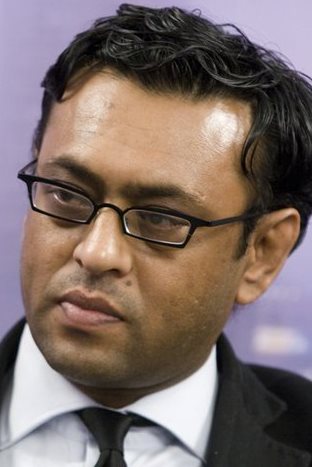
Banner

The three epistles and all the background
ANT KATZ
Pictured left: Fed and Board chairmen Swartz and Katz
The difference this time around, and something not seen in South Africa before, is the amount of collusion between formal media and political NGOs – and the collateral relationship damage between the colluders and organisations such as, to name but a few:
- The South African Police Service (SAPS);
- SAPS’ elite priority crime-fighting Hawks unit;
- The Press Council;
- The Media Ombudsman; and
- Israel and her SA Embassy.
There is little one can offer to sum up the situation than the following three epistles.
The first was an attack of unbelievable proportions by Ebrahim Fakir against a non-Jewish reporter, Barry Bateman, of Eye Witness News (EWN) for simply doing his job – entitled titled: “Barry Bateman, the Israeli ambassador, and a throwback to apartheid”. Fakir claims that the deaths on the Mavi Marmara were “met with shrill hysteria from supporters of Israel, notably Arthur Lenk, the Israeli ambassador to South Africa, the South African Zionist Federation (SAZF) and the South African Jewish Board of Deputies (SAJBD).”
This was followed two days later by a carefully considered response by Bateman: “Reporting on Israeli arrest warrants not agenda-driven” which begins with the words “from the outset, let me place on record that I reject with contempt claims made by Ebrahim Fakir that my research and reporting into the arrest warrants issued for four Israeli military commanders was agenda-driven.” Bateman’s rebuttal gave Fakir a response as vicious as the initial attack had been – except that the seasoned journalist was speaking from the moral high ground, says our pundit, “the truth”.
The final epistle was “Not for the first time, local anti-Israel activists have been caught in a lie”, was the title of an unusually terse joint- statement in a communal letter issued by Ben Swartz, chairman of the SA Zionist Federation and Jeff Katz, chairman of the SA Jewish Board of Deputies.
Related reads on SAJR Online:
-
- 17 Nov:HAWKS: IT’S ALL ‘MALICIOUS GOSSIP’
- 18 Nov:‘ARREST WARRANT’ STATEMENT PURE HOGWASH
- 20 Nov:FED’S SWARTZ BASHES INDEPENDENT NEWS
- 23 Nov: SAPS ‘DUMBFOUNDED’ OVER MAVI MARMARA LETTER
- 04 Dec: OMBUD INVESTIGATES COMPLAINTS AGAINST IMG
Ebrahim Fakir published this piece on THE DAILYVOX.co.za last week titled: “Barry Bateman, the Israeli ambassador, and a throwback to apartheid”
A sense of supremacy ingrained by a history of racism is hard to purge, he says. And he argues it is particularly prevalent in the attitudes of supporters of Israeli apartheid in South Africa.

RIGHT: Ebrahim Fakir
Last week, a landmark decision was made by South African authorities regarding a long-standing case involving the Israeli army, Turkish authorities and a South African journalist. Independent Newspapers’ Group Foreign Editor Shannon Ebrahim reported that the SAPS had decided to abide by a Turkish call in 2014 to arrest four Israeli commanders, said to be responsible for the attacks on the Gaza Freedom flotilla, intended to deliver humanitarian aid and medical supplies to Palestinian territory of Gaza in May 2010. Nine people died in the attack, with a South African journalist, aboard the flotilla at the time, surviving the attack.
The news was met with shrill hysteria from supporters of Israel, notably Arthur Lenk, the Israeli ambassador to South Africa, the South African Zionist Federation (SAZF) and the South African Jewish Board of Deputies (SAJBD).
This decision is the result of a four-year long legal battle involving journalist Gadija Davids, who was on board the flotilla, reporting live for South African media. Davids was one of more than 700 activists from across the world who were intimidated, assaulted and kidnapped in international waters. In addition, Davids was denied consular access while being held in an Israeli prison.
Davids laid a complaint with the SAPS and the NPA in 2011 and in 2012 the Priority Crimes Litigation Unit of the NPA found that the case fulfilled the jurisdictional requirements of the Rome Statute. In September, an arrest alert notice was circulated to Border Control which means the Israeli commanders would be apprehended on entry into the country and Interpol Pretoria will then arrange with Turkish authorities for their extradition. The information has also been forwarded to Interpol SA to liaise with Interpol in Turkey for a red notice, an international request for co-operation or alerts allowing law enforcement agencies in member states to share critical crime-related information.
This case provides an opportunity for South Africa to exhibit its commitment to international human rights law by taking action against the Israeli apartheid regime, and in part playing a role in mitigating the inconsistency and biases of the notoriously selective ICC in what it pursues. These arrest warrants constitute a direct challenge to the Israeli government, which continues to pretend it is not in contravention of some 80 UN resolutions.
The hysterics of Israeli apartheid supporters is especially significant.
The co-operation between Turkish and South African law enforcement agencies shows that the ICC is not the only international instrument Israel may need to fear. Israel’s insulation from international law is narrowing.
This of course sparked panic among the SAZF, SAJBD and the comically irrepressible Israeli ambassador Arthur Lenk. This precipitated a shrill screech of a series of allegations that this simply cannot be true, and that the Media Review Network which publicised this historic decision, was lying.
Aided by a factually misguided statement on this decision by BDS-SA , who in its zeal to be the definitive face of Palestine-related activism in South Africa, put out an incorrect statement suggesting that the South African authorities had issued warrants of arrest for the Israeli war criminals, instead of it being the Turkish authorities with whom the South African authorities would co-operate. The incorrect statement was subsequently recalled and repudiated by BDS-SA itself when it realised its error.
So, the BDS-SA statement is of no consequence.
With that statement out of the way, Lenk, the SAJBD and the SAZF no longer had BDS’ factual inaccuracy to latch onto, to undermine the broader import and implications of this case. Consequently, they resorted to casting aspersions on the integrity of the Media Review Network (MRN). This sparked demands to see evidence confirming the SAPS saying it is ready to act in a manner consistent with international law be provided to the SAJBD and SAZF.
The MRN was commanded to produce evidence. The SAPS was commanded to produce its letter. A journalist reporting the story for the Independent Newspapers was commanded to reveal her sources. Suddenly, even Gadija Davids’ attorney, Ziyad Patel, was expected to disclose sensitive and confidential information that could jeopardise his case.
And then the curious case of Barry Bateman.
These commands were followed by demands from a “journalist”, Barry Bateman, for the same information. In spite of a report in the Independent Newspapers by Shannon Ebrahim, reporting news of this case, Bateman persisted in joining the chorus of the SAJBD and SAZF in insinuating that the MRN and by implication Shannon Ebrahim were lying. In other words, Bateman, a journalist baselessly questioned the veracity of a report and the credibility of the sources of a fellow journalist.
He should have known better than impugning the professional reputation of a colleague, whose reports made clear that she had seen South African authorities’ confirmations that it would act consistently with its international obligations. There have been many demands by the supporters of Israel to have sight of the written confirmation of the decision.
In fact the SAZF has even threatened to act against the Independent Newspaper Group if it fails to publish privileged correspondence from a source. These “commands” should be met with the dismissive contempt they deserve. This derisive superiority complex which the SAZF and the SAJBD still attempt to enforce, is an embarrassing throwback to the old, racist South African regime, not unlike Israel today.
No shrill Zionist screech can, or should make the written confirmation appear. One sees it when one needs to see it. Notwithstanding BDS-SA’s error, rectified in a matter of minutes, the SAZF, SAJBD, Arthur Lenk and Barry Bateman revealed a hubris that black South Africans have grown accustomed to when dealing with paternalistic and patronising whites. It appears a sense of supremacy ingrained by a history of racism is hard to purge.
The transparent tactic to intimidate is aimed at setting the agenda and controlling the discourse on Israel. It is nothing more than a transparent ploy for Zionist enforcement. But this is not propaganda. It is a matter of law. There is no hate speech or exhortation to violence. And Barry, have I got news for you. Questioning the bona fides of a fellow journalist who reports having seen a letter, is an attempt to force a colleague to reveal their sources. You should know better. When Lenk, the SAZF and SAJBD command others to see the letter they do so for propaganda purposes; you, of course, are entitled to do your due diligence as a journalist.
But when you discredit a story based on a denial by a government official, your bias is showing. Would you have relied on the first pronouncements of government spokespeople for the big stories you’ve broken?
Barry Bateman: Reporting on Israeli arrest warrants not agenda-driven
EWN reporter BARRY BATEMAN responds to a recent column by Ebrahim Fakir, published earlier this week on The Daily Vox.
 From the outset, let me place on record that I reject with contempt claims made by Ebrahim Fakir that my research and reporting into the arrest warrants issued for four Israeli military commanders was agenda-driven.
From the outset, let me place on record that I reject with contempt claims made by Ebrahim Fakir that my research and reporting into the arrest warrants issued for four Israeli military commanders was agenda-driven.
LEFT: Barry Bateman
This allegation, and others, was published on the Daily Vox website on November 23, 2015. I was not approached for comment, despite the claims calling into question my integrity. The headline in particular (“Barry Bateman, the Israeli ambassador, and a throwback to apartheid“) is sensational, inaccurate and misleading.
During the course of my everyday duties as a senior reporter, I received a statement from lobby group Boycott, Divestment and Sanctions Against Israel in SA (BDS). The statement announced that arrest warrants had been issued against four Israeli commanders in connection with the Turkish flotilla siege in 2010. The first statement, issued on November 17 claimed the arrest warrants had been secured by South African authorities. This was later retracted and corrected. The origin of the information being shared by BDS was the Media Review Network (MRN).
From the arrival of the first BDS statement, I spent four days trying to confirm the information. Through formal channels, I approached the police (Hawks), the National Prosecuting Authority (NPA) and the department of home affairs. By Friday, after numerous telephone conversations and email exchanges, all three organisations denied any knowledge of the arrest warrants.
Because of the on-the-record denials from the SAPS, NPA and home affairs, no story was published. I was determined to get clarity and so I approached BDS, MRN and Gadija Davids, the reporter who had been caught up in the 2010 incident.
The five questions I posed were in no way a challenge to the organisations or the journalist, but merely an attempt (perhaps over-zealously) to obtain information for my story. I set out the denials that had been issued and asked for any further information that could assist me.
Thirty minutes after the questions were sent, the MRN’s vice-chairperson, Aayesha Soni took to Twitter with the following: “When did you become the South African Zionist henchman, using your job to further occupation and injustice?”
There is no need to dwell on how inflammatory this comment is, nor on the fact that it is completely baseless. What came next was a string of tweets in which Soni accused me of carrying out the requests of Israeli Ambassador Arthur Lenk, sending threatening messages and attempting to breach lawyer/client confidentiality between Davids and her attorneys. There is nothing unusual or threatening in the media enquiry I sent and the claim that I was carrying out a request for Lenk is untrue.
At this point, Ebrahim Fakir entered the fray. Every attempt to explain what had transpired fell on deaf ears.
On November 22, 2015, five days after the first BDS statement, the police finally confirmed that while no arrest warrants were issued in South Africa, local authorities had received a letter from their counterparts in Turkey requesting that should the four Israeli commanders enter this country, they be arrested.
“At the beginning there were some rumours that were spreading about a letter that was signed by our members regarding the four commanders from Israel. Now, following thorough consultation we can confirm that that letter has been received. Currently it is with our CAS Unit (Crimes Against the State). It will then be processed through our internal channels to Interpol for further processing.”
As soon as the first official confirmation arrived, I tweeted the news (flagging it directly with Soni) and compiled a report for Eyewitness News, which was broadcast the following day. Hours later, Fakir’s column appeared on the Daily Vox website and was promoted throughout the day on social media.
As I see it, Fakir’s argument suggests that claims made by the MRN, BDS and Davids are beyond scrutiny, and that I as a journalist should have accepted these claims without question. He further argues that confirmation by a journalist from another media house (Independent Media) is sufficient basis to accept the reports as truth. But it is clear that I would be failing in my duties as a journalist if I did not independently verify the information.
I have worked as a reporter for over a decade and have carried out countless complex and high-profile investigations. To me, seeking confirmation for the arrest warrants was an absolutely routine and most basic requirement.
Another concern with Fakir’s criticism is that it creates an impression that questioning a pro-Palestinian organisation is proof that the person asking the questions is fighting in the pro-Israeli corner. Nothing could be further from the truth. This is a knee-jerk reaction that ignores the great extent to which I went to establish the truth behind the claims. It further ignores the fact that I deliberately did not publish any story about the initial denials by the police.
My approach was inconsistent with someone who carries an agenda and seeks to discredit any organisation or person. It is, however, consistent with the principles of ensuring accuracy and affording right of reply to those involved.
Nowhere in my correspondence with BDS, MRN and Davids did I request that any client/attorney privilege be broken. I merely asked for any information that could help confirm the story. In fact, such proof was made available to another reporter, Shannon Ebrahim, who mentioned it in her article (“Israeli Military Chiefs Face Arrest in South Africa” – 18 November 2015).
While the Israel/Palestine debate is a sensitive and controversial one, it should never be used to undermine those who work tirelessly to build their credibility. We all have a duty to approach all stories and columns with a greater responsibility, without resorting to personal attacks.
-
Joint-statement issued by Ben Swartz, chairman of the SA Zionist Federation and Jeff Katz, chairman of the SA Jewish Board of Deputies . Not for the first time, local anti-Israel activists have been caught in a lie.
Organisations like BDS SA and the Media Review Network and sectors of the media have been loudly proclaiming that SAPS has agreed to enforce arrest notices issued by Turkey against four Israeli military commanders should they enter South Africa. They have also claimed that they have documentary evidence that conclusively proves this.
Both of these claims have since been shown to be outright falsehoods. SAPS have made no such undertaking. All they have done is confirm that they have received a formal request from Turkey asking that the four Israeli Defence Forces commanders be arrested if they enter South Africa.
In terms of how international police co-operation works, South Africa will in any case only enforce an arrest warrant for crimes committed outside its borders once Interpol (the International Criminal Police Organisation) issues a “Red Notice” in that regard. It is completely contrary to South African policy to undertake to enforce an arrest warrant issued by another country in the absence of such a Red Notice.
As for the “written proof” that SAPS has supposedly provided showing that it intends to enforce the Turkish arrest notices, it can now safely be concluded that it does not exist. This became quite clear at a press conference convened on Monday by the Media Review Network and Palestine Solidarity Alliance. It had been promised that this documentation would be made public at this event, but nothing whatever was produced in the end.
Yet again, therefore, local anti-Israel extremists have been shown to have deliberately misrepresented the facts in order to push their obsessive agenda against the Jewish State. They have done so in this case to fool the public into thinking that South Africa endorses attempts to hijack and manipulate international law as a political weapon against the State of Israel. This shows not only a flagrant lack of integrity on their part, but a contemptuous disregard for the South African public as a whole.
-
Shannon Ebrahim is the group foreign editor for Independent Media Group. Before joining Independent Media, she worked as an International Affairs Consultant for Al Jazeera and Your Middle East, she has also been director for Asylum Seeker Management in the Department of Home Affairs; Project Manager: East Africa and the Middle East for the National Intelligence Co-ordinating Committee and she served in the Presidential Support Unit, specialising in conflict in Africa and the Middle East. She was educated in Canada and is married to immediate past-deputy minister of DIRCO, Ibrahim Ibrahim.
What was the Mavi Marmara?

LEFT: The Turkish ship Mavi Marmara was part of a flotilla of six civilian ships which sailed from Turkey on May 31, 2010, trying to break an Israeli blockade of Gaza. It was the only ship in the flotilla which refused Israeli military instructions not to proceed – and was thus boarded by Israeli naval commandos. Some 40 of the 590 passengers put up a fight. Nine – eight Turkish nationals and a Turkish American died. A tenth one died some four years later, having been in a coma. Ten of the Israelis commandos were injured, one seriously, as they were attacked on boarding. It put tremendous strain on Israeli-Turkish relationships.




